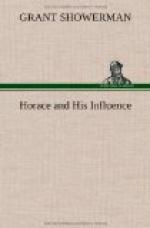It will be better to say that Horace finally came more fully into his own. This was not because he changed. He did not change. The times changed. The barriers of intellectual sloth and artificiality fell away, and men became accessible to him. Virgil lost nothing of his old-time appeal to the fancy and to the ear, but Horace’s virtues also were discovered: his distinction in word and phrase, his understanding of the human heart. Virgil lost nothing of his charm for youth and age, but Horace was discovered as the poet of the riper and more thoughtful mind. Virgil remained the admired, but Horace became the friend. Virgil remained the guide, but Horace became the companion. “Virgil,” says Oliver Wendell Holmes, “has been the object of an adoration amounting almost to worship, but he will often be found on the shelf, while Horace lies on the student’s table, next his hand.”
The nature and extent of Horace’s influence upon modern letters and life will be best brought into relief by a brief historical review. It is not necessary to this purpose, nor would it be possible, within ordinary limits, to enter into a detailed account. It will be appropriate to begin with Italy.
i. IN ITALY
Horace did not spring immediately into prominence with the coming of the Renaissance, whether elsewhere or in Italy. As might be expected, the essentially epic and medieval Dante found inspiration in Virgil rather than in Horace, though the Ars Poetica was known to him and quoted more than once as authority on style. “This is what our master Horace teaches,” runs one of the passages, “when at the beginning of Poetry he says, ‘Choose a subject, etc.’” The imperfect idea of Horace formed in Dante’s mind is indicated by the one verse in the Divina Commedia which refers to him:
L’ altro e Orazio satiro che viene,—
T_he other coming is Horace the satirist_.
With Petrarch, the first great figure to emerge from the obscure vistas of medievalism, the case was different. The first modern who really understood the classics understood Horace also, and did him greater justice than fell to his lot again for many generations. The copy of Horace’s works which he acquired on November 28, 1347, remained by him until on the 18th of July in 1374 the venerable poet and scholar was found dead at the age of seventy among his books. Fond as he was of Virgil, Cicero, and Seneca, he had an intimate and affectionate knowledge of Horace, to whom there are references in all his works, and from whom he enriched his philosophy of life. Even his greatest and most original creation, the Canzoniere, is not without marks of Horace, and their fewness here, as well as their character, are a sign that Petrarch’s familiarity was not of the artificial sort, but based on real assimilation of the poet. His letter to Horace begins:
Salve o dei lirici modi sovrano,
Salve o degl’ Itali
gloria ed onor,—




